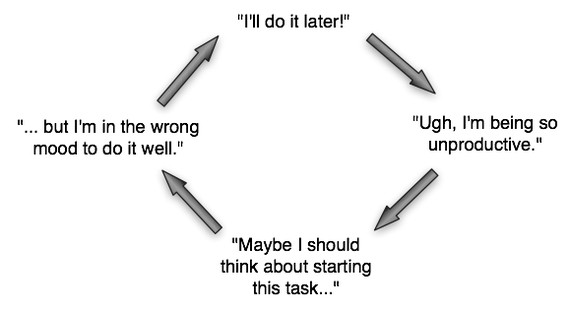Why Everything You Know About Motivation Is Wrong

Let me explain.
Motivation as we know it is a buzzword these days, and it gets banded around by everyone and their dog. Most people confuse it with other words such as Inspiration and drive etc. Just look at the use of the word over the last 120 years in literature. It seems everyone got motivated!

You can see that its popularity has grown but so has its meaning. There are numerous interpretations of the word by various authors and scientists that can go deep into the scientific and philosophical meaning of the word.
However, I will focus on what I would call popular the meaning of the word motivation.
Motivation = Inspiration to act
But let's examine the Internet ...
What is motivation? What does Wikipedia suggest?
Motivation: is what explains why people or animals initiate, continue or terminate a certain behaviour at a particular time.
What does the Online Dictionary say?
The act or an instance of motivating, or providing with a reason to act in a certain way.
So, in other words, Motivation is what makes us do things or stop doing them. It's something that is triggering us to change... let's say you in desperate need of some motivation; what would you do? If you type motivation into YouTube you get a billion videos on "motivation". Usually, they are clips of successful celebrities offering their wisdom. How they worked hard and got through the tough times. Even the music is epic... you know the type.
Inspiring stuff. Right?
This kind of motivation gets you to feel like you can achieve anything if you put your mind to it. You feel invincible, and you can work for hours. That's great.
But here is the problem. What happens when you really don't feel like it, and then you say to yourself:
"Well, I'll get motivated tomorrow/later, and then I will take on the world! "
Before you know it, you back to little progress being made because you feel you are not in the right frame of mind.
So this is the problem right here...
Motivation, in principle, is based on the mistaken notion that a specific mental or emotional state is required to perform a task.
This means your work progress is subject to how you feel on the day, translating to how much you get done. Correct me if I am wrong, I have never heard a successful person say the following:
"I don't feel like doing something that is really important to me, I shall do it tomorrow as I will be more motivated"...
Or
"I usually work when I feel like it."
In fact, if you take a deeper dive into what pretty much all successful people talk about is having the discipline to go the distance.
Why is that important?
Discipline separates action from moods and emotions, thus dealing with the problem by continuously improving it.
The ramifications of that are enormous.
Why?
Because you no longer have to feel like it to do anything you want.
💥Boom! You are welcome!
But hold on, how did we get to the problem in the first place?
Problem One: The "Correct" Mood
Waiting for the "correct" mood becomes a particularly sly kind of procrastination when action is dependant on feelings. That is something I am painfully aware of, and I wish someone had pointed it out to me a decade ago, before I had to learn the hard way. (They probably did, but... I am sticking to my ignorance).
If you are reading this blog, that means you have been through this cycle once or twice. But here is a simple example of the Procrastination Loop of Doom.

Of course, there are more complex versions, but looking for those will be a procrastination task so, I am sticking with this one.
Motivational thinking implies that you have to feel like a winner before doing the work and ultimately winning.
I am sure if you ask many elite athletes, they don't feel like training every day, but they do it because of their discipline. When James Clear interviewed trainers of athletes at the top level, he was surprised that some up-and-coming athletes quit because of boredom. Because let's face it, running 20,000 laps at the indoor track by yourself is going to get boring at some point.
It's paradoxical that to be motivated, you need to detach any emotion from the action.
The disciplined approach is to break the link between feelings and actions and yet accomplish it anyway. You feel fantastic, electric, active, and in some cases, develop a swagger (not a limp). This is because you will feel like a winner because you are taking the actions of a winner.
It's kinda ironic, don’t you think?
Problem Two: Motivation is not an infinite resource
You can only read so many Motivational books and listen to David Goggins video bombs before ultimately motivation wears off, and you go back to being who you were before engaging in "motivation". So really, you are back to square one. Think of it like the boost button, it goes back to normal once the juice runs out.
Look, I am not saying that this kind of "Motivation" is not needed. what I am saying is it cannot be sustained over a longer period of time. Because you cant achieve consistent results while working when you feel like it.
Of course, this kind of motivation has its place, in sports events or a final push to get the project over the line but it cannot be the Modus Operandi. Equally, it can kick start a habit, by putting discipline in place that will pay dividends in the long run because it will become a self-fulfilling prophecy.
Think of Motivation as a match that starts the fire and discipline as coals that keep the fire going and the more coals you put it the bigger the fire. 👇

Problem Three: Motivation Meets Reality
Because real life in the actual world periodically needs individuals to do things that no one in their right mind can be too happy about, "motivation" faces the impossible challenge of eliciting excitement for things that do not objectively warrant it.
So as a result, folks start to look for ways to further "Motivate" themselves, buying books and attending online seminars to find the missing piece of the puzzle because that "Motivation" high habit is not going to sustain itself! Looking at you self improvement junkies!
Unfortunately, You can't make data entry jobs sexy or get most people excited about the latest Excel formula. Some jobs are just boring, but thats the job. It seems that a lot of professional folks are finding their jobs boring from Legal, project management to IT. Source here. You have to manage your expectation of what you are going to get.
Trust me every job can be boring if you want it to be.
People used to tell me "it's alright for you, you travel the world with your consultant Job" - but what they miss is that it is seldom that you get to do anything fun. People pay for you to be somewhere at a specific time performing a certain task. For me, that was usually in a factory negotiating with my opposite number.
And if you find it boring... You are the captain of your ship! Change course.
🏁 So, in summary:
Discipline is a Habit/Strategy sort of thing, and "motivation" is a flashbang. (it is effective but for a short period). Both have their uses, but you need to know how to use them both to be a lean, mean productivity machine.
Thats great Mr Sharp... but what do I do now? Good news. I have there is a practical guide to getting your discipline in organised. Part two is coming.

